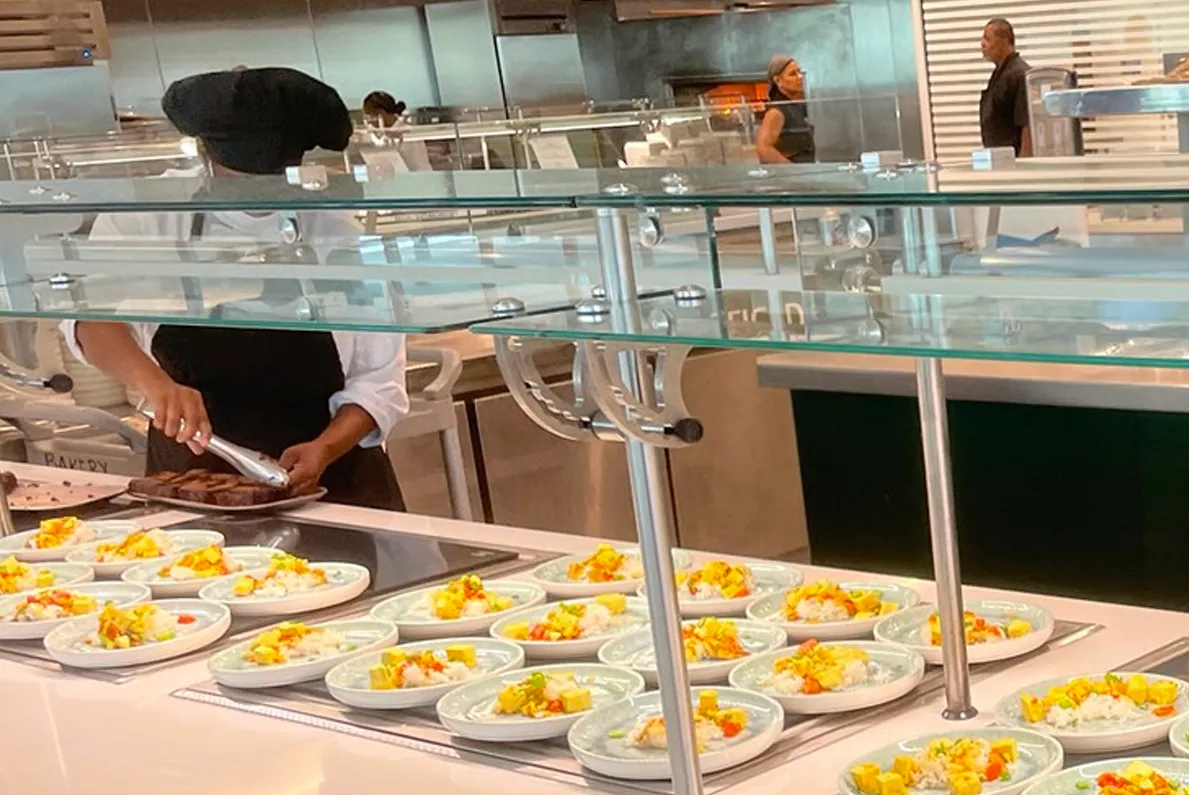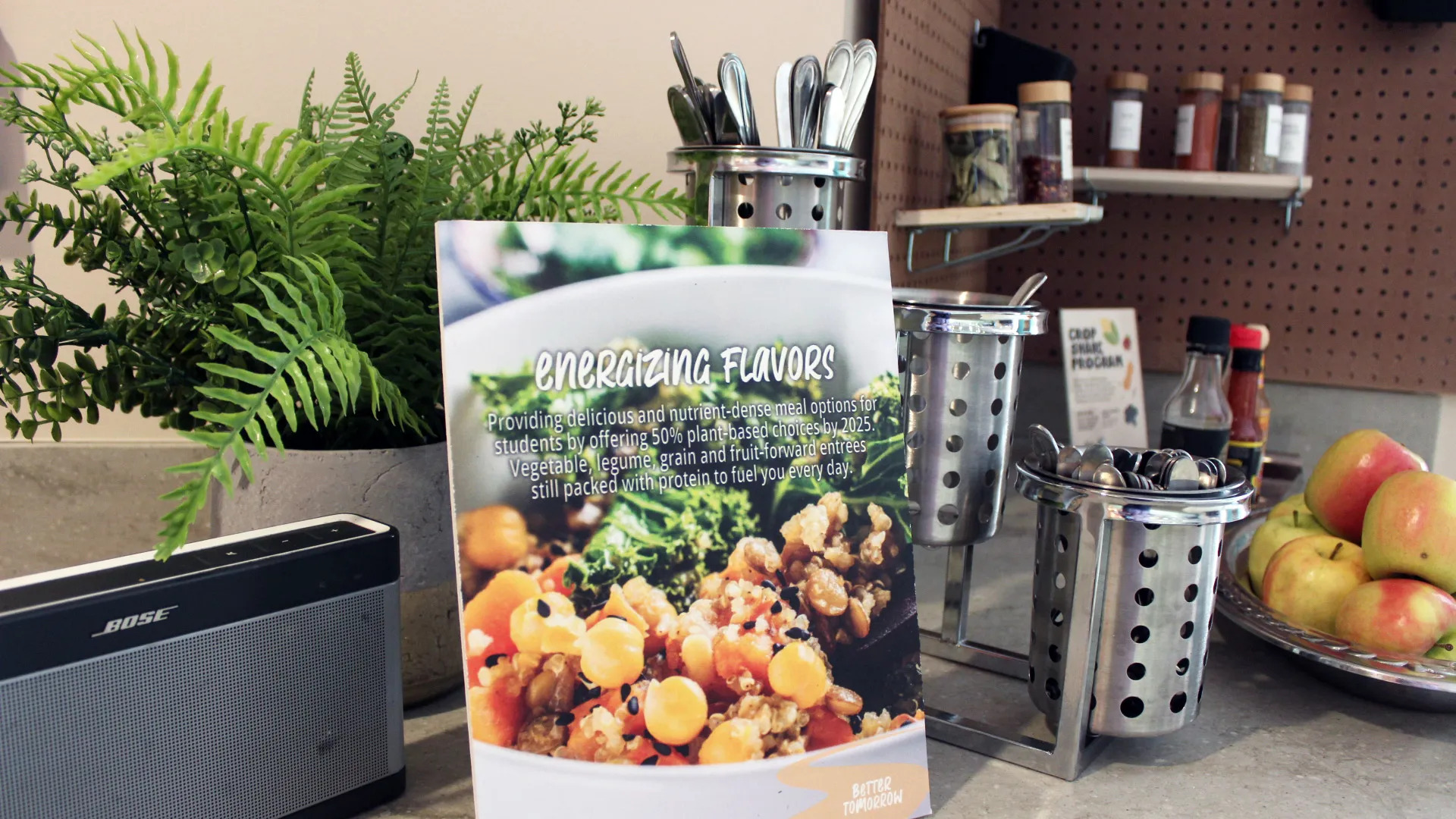Sodexo, one of the world’s largest foodservice companies, has massively expanded plant-based dining at its nearly 400 universities nationwide following its recent trial of DefaultVeg. The move comes on the heels of a pilot study by Food for Climate League (FCL) in partnership with us at the Better Food Foundation (BFF), which found that serving plant-based foods as the default increased the average rate of students choosing these dishes by 58.3 percent, as reported in the Journal of Environmental Psychology.
Now, Sodexo has leveraged this monumental success to bring plant-based nudges to its entire U.S. university portfolio. Unless schools opt out, the main hot food station in their dining halls will alternate daily between plant- and animal-based entrees as the first option. Further, schools have added another station that is entirely plant-based! Collectively, the dining halls at these schools serve approximately 1 million students every day.

How We Got Here: The 2022 Pilot
With support from FCL and BFF, Sodexo embarked on a 5-week experiment to test the power of plant-based defaults. Switching its foodservice cycle across three campuses, all-you-care-to-eat dining halls at Tulane University, Lehigh University, and Rensselaer Polytechnic Institute alternated between plant-based and meat-based dishes as the default option at hot stations.
On days when plant-based meals were the default — absent any other changes to the dining experience — the average rate of students choosing plant-based dishes increased by 58.3 percent, according to the new peer-reviewed article authored by Boston College researchers Joel Ginn and Gregg Sparkman (who both oversaw the pilot).
A separate report on the same pilot program produced by FCL and BFF suggested an even greater benefit for campuses that follow this strategy consistently, finding that the two universities in the pilot that did so saw an astonishing 150 percent increase in the rate of students choosing plant-based meals. This resulted in up to 81.5 percent of students choosing plant-based dishes. Further, across the three schools, the shift led to a 23.6 percent drop in the greenhouse gas emissions attributed to food service.
“DefaultVeg is proving that plant-based eating is both popular and powerful with Gen Z. Sodexo’s changes will have a real impact on the health of students and the planet. And this new, rigorous study demonstrates that most students happily choose plant-based meals over other options when we make the choice easy and delicious. We hope to see Sodexo expand this strategy further and incorporate even stronger plant-based nudges into all the ways they are serving food on campuses.”
Jennifer Channin, Executive Director of the Better Food Foundation
Importantly for students advocating for changes in their own dining halls, DefaultVeg is appealing to decision makers who might be wary of restricting choices. It provides a surefire way to rapidly impact the meals students are choosing to eat, simply by reframing the menu to normalize climate- and animal-friendly foods. Making plant-based offerings the default, while still giving people the ability to opt in to meat and dairy if they wish, is inclusive, sustainable, and healthy — without sacrificing anyone’s choices.

Are students happy with these changes? Here’s some feedback from students at George Mason University in Fairfax, Virginia, which is one of the most proactive campuses Sodexo serves. Mason has not only upped its plant-based offerings throughout its main dining halls, but also added an entirely veg dining hall called The Spot.
“I think it’s important because it’s reducing the amount of meat consumption overall from students, and also it’s adding more diversity. Foods without meat are often from other cultures, allowing us to experience more fun, cool foods.”—Madelyn
“It is so yummy! All the food is really good, compared to other places where it doesn’t feel as fresh or welcoming.” —Sydney
“Every time I come here to The Spot, the [vegan] hamburgers are really good, and they’ve never disappointed me!” —Karen

Looking Forward: The Next Wave of DefaultVeg
Sodexo is eager to make further progress in this area with an eye on reaching its corporate sustainability goals, understanding that leveraging its presence in higher education puts the company at a unique advantage when it comes to carbon reduction.
From celebrating World Pulses Day to rolling out a Plant-Forward National Patient Menu, Sodexo is making strides around climate-friendly food. A carbon roadmap guides them toward stated carbon reduction goals, and they build tactical menus around it: “What percent plant-based do we need in order to meet goals?” To reduce company-wide emissions 34 percent by 2025, they’re increasing plant-based meals to 33 percent of the menu. In universities, they’re more ambitious: Sodexo aims for 50 percent of its college and university menus to be plant-based by 2025.
“I’m thrilled to see the expansion of DefaultVeg — an innovative, plant-based eating program — to nearly 400 colleges and universities in North America! Not only will this expose more students to the nutritional benefits of plant-based eating, but it will also help us continue to cultivate a more sustainable future together!”
Jim Fjelstul, President and CEO of Sodexo
With just one calendar year separating Sodexo from its goals, DefaultVeg strategies can surely help the foodservice leader hit the mark and build a plant-forward future. While the pilot study led Sodexo to incorporate plant-based nudges into their college dining halls, the changes made to the national menu don’t quite go as far in nudging diners as the ones used during the study itself. There’s room for improvement, and we’re excited to help Sodexo get there — and inspire other companies and schools to adopt changes that not only increase access to plant-based foods, but also normalize and encourage plant-based dining, shaping the expectations of an entire generation of college graduates.
You can help continue fueling this change as one of our Student Ambassadors! Already, Ambassadors’ work with BFF has transformed food in nearly 100 university departments and campus coffee shops, including at Harvard, Stanford, and Pomona College. It’s easy to become a part of this plant-forward revolution at your own school. Sign up to become a DefaultVeg Ambassador, and we’ll equip you with trainings, tools, and community — and there’s a spot for everyone at the table, whether you want to get your club to use DefaultVeg for its events or work with your dining hall to follow in Sodexo’s footsteps.
Latest News
See All NewsThis Simple Shift is Transforming Our Food Systems
Learn more about the science of human behavior and the power of nudges happening quietly in many food service settings–from university campuses to hospitals and coffee shops worldwide.
Nudge Online Training Sessions
Join the Better Food Foundation for a hands-on workshop that puts powerful climate solutions into your hands. You’ll learn to implement the top five evidence-based behavioral science strategies that reduce carbon, land, and water footprints across diverse institutional settings.
Simulating A Thriving Food System For All
Join Climate Interactive, Plant Based Treaty, and the Better Food Foundation to explore how plant-based diets can combat extreme heat, protect biodiversity, and secure our future.